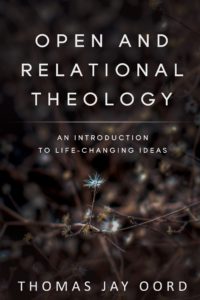Five Kinds of Biblical Inspiration
It’s common for Christians to claim God inspired the authors who wrote the Bible. If God inspired the biblical authors, goes the thinking, then the Bible is inspired by God.
Steven Hause recently asked me about biblical inspiration. In my response, I claimed that biblical authors get some ideas about God right, but other biblical ideas are wrong. While the Bible is inspired, it has erroneous views of God and the world. Here’s a link to the interview, Symbiotic Inspiration.

My friend and former doctoral student Brian Felushko has been talking with me about inspiration for years. In my conversations with him and others, I realized that “inspiration” can mean many things.
In this essay, I outline five ways we might talk about God inspiring the biblical authors. I also identify which of the five I like. I’d love to hear your thoughts.
1. Inspired by an Idea
One way to talk about biblical inspiration is to say the biblical writers had ideas about God and wrote about their ideas. This way of talking doesn’t require God to reveal or even exist. But it says the idea of God inspired the authors of scripture.
I want to say more than this when I say, “God inspired the biblical authors.” I think God actually exists and communicates. I want to speculate about who God is and how God acts. But some people speak about biblical inspiration and mean the biblical author’s ideas about God inspired them to write the Bible, not God’s actual communication.
2. Inspired by an Object
Another way to talk about biblical inspiration says God exists and that existence in some way motivated the biblical authors. God in this view doesn’t choose to self-reveal in response to creation. God is more like an inanimate object or image: a painting, sunset, or bright light.
This view of God fits the ideas of some of Christianity’s most influential theologians. They say God is immutable, impassible, timeless, and simple. God so conceived is more like an inanimate thing than an interactive person.
This God doesn’t choose to self-reveal in give-and-receive relations with creation. In some mysterious way, an impersonal God communicated to the biblical writers. For a host of reasons, I reject this view of God. (For an introduction to an alternative vision, see Open and Relational Theology; a more scholarly argument is available in my book Pluriform Love.)
3. Symbiotic Inspiration
A third way to talk about biblical inspiration says God is a universal, personal, and uncontrolling Spirit who self-reveals to everyone at all times. This is the view I prefer.
By “personal,” I don’t mean God is a being with a localized body. “Personal” means an agent who has intentions, responds, and acts in relation to creation. A person can self-reveal, like when I disclose my thoughts to you by writing this essay.
I think God always communicates to everyone and everything. The Bible is a rich source of human interaction with this always communicating God. But creation is also a source of revelation. So are the arts and sciences. God self-reveals in many ways.
The symbiotic view of inspiration says the Bible is a product of both God and humans. As I see it, every moment involves both divine and creaturely causation. The moments described in the Bible are no different from other moments in this general sense. But overall, the Bible offers richer insights than other sources I know.
Perhaps most importantly, the symbiotic view I propose says God never controls creation. In fact, God is uncontrolling by nature. God cannot control anyone or anything.
I believe the uncontrolling God of love inspired the writers of the Bible. But God could not control what they wrote and what was included in the canon. Sometimes the writers intuited well what God communicated; other times they largely missed the message. The Bible is a mixed bag. An uncontrolling God also inspires us as we read scripture, but God cannot control our interpretations. (Tripp Fuller and I talk about this in our book God After Deconstruction.)
4. Inspired by an Occasionally Controlling God
The fourth way to talk about God inspiring the biblical writers also says God is universal and personal. But it claims God had the power to control the writers and occasionally did so. This is a common view of divine inspiration, but I reject it.
This view of biblical inspiration implies God can provide a crystal-clear, unambiguous revelation. And God occasionally did so but not always. God sometimes accommodated to the erroneous ideas of those who penned sacred writ.
We rightly wonder why this God doesn’t always provide a clear and error-free revelation. After all, many people claim not to find salvation because they are confused by the Bible. They don’t receive totally clear messages from God. Wouldn’t a loving and omnipotent God provide an error-free revelation to those seeking salvation? The omnipotent God who can communicate clearly but chooses to hide is not doing all this God can do.
I’m not attracted to this view of God or to the view of biblical inspiration it entails.
5. Inspired by an Always Controlling God
The final form of biblical inspiration is common among those who say, “God is totally sovereign” or “God is in control.” This form says every part of the Bible is divinely orchestrated and, therefore, free from error. I not only reject this view, I also don’t think we should call it “biblical inspiration.” In our everyday use of the word “inspire,” we don’t mean “one person entirely controlled another.”
Those who hold this view of biblical inspiration typically say the Bible as the inerrant, infallible “Word of God.” But in doing so they must ignore countless errors, contradictions, and mistakes. They may acknowledge that the oldest biblical manuscripts have discrepancies, but they make the vacuous claim that the original manuscripts were error-free. This cannot be proven. (For more on the errors of biblical inerrancy, see this short article.)
This fifth view of God also has the disastrous implications of implying that God ordains all evil. An always controlling God causes all things, good and bad. The view also implies that we are not truly free, and that chance is an illusion. Because of the pain and confusion it causes, I despise this view of biblical inspiration.
Conclusion
As I said above, I find the third form of biblical inspiration most viable. When I say God inspired the authors of scripture and inspires us, I mean God self-reveals in uncontrolling ways.
A huge advantage to my view is that I don’t have to claim God caused or allowed the biblical errors, discrepancies, contradictions, or mistakes. I can blame the writers, whom not even God could control. I also don’t have to justify divine violence in the Bible or mixed messages about God.
My approach fits the obvious fact that biblical writers saw the world from a particular point of view. It allows me to treat the Bible as literature to be analyzed like other literature might. But it also prompts me to be open to the possibility that the Bible tells me something true about God, myself, and the world.
The symbiotic view of biblical revelations requires me to make judgments about what might be more accurate in the Bible and what might be less accurate. I bring to bear a number of factors when making such judgments. My view of God makes a difference in this process. So does my understanding of history, myself, literature, and more. It’s an ongoing process of approximation and fallible discernment.
I don’t claim to be certain about my biblical interpretation or view of inspiration. But I don’t think anyone can be certain. We all see through a darkened glass, as the Bible says. But I try to do the best I can, and I try to be clear about my preferences. (On the problems with absolute certainty and absolute mystery, see this short essay.)
Am I missing something? What are your thoughts?




Comments
There are two things (and more) that I appreciate about this “little” essay that says “big” things: 1) Your explanations of five views on inspiration are clearly, yet succinctly conveyed; and 2) You share the view to which you subscribe openly, with both conviction and humility. I wish more theologians would do the same so that when they appeal to the Bible I can know whether they are appealing to some level of biblical authority or rather that they are appealing to the biblical texts illustratively (i.e., not to prove a point but to illustrate that at least some of the authors/editors of the biblical texts saw God and the universe in a certain way).
Thanks for your comments, Brian. And for spurring me to seek greater clarity on this issue!
Yep. Completely agree with you. Option 3 pretty much maps onto how I was taught about scripture at Catholic high school, decades ago
Interesting post. My concern with your perspective is that it inherently implies that if you can discern when the biblical authors are wrong about the revelation of the character of God, then it means you have personally received a more accurate revelation of God and God’s character than that of the biblical authors. Further, it makes me concerned that, rather than struggling with the texts about God’s character which do not fit your “revelation”/assumptions/paradigms, you can simply say “well, the authors got it wrong” and ignore the text altogether.
This leaves me with three questions for you:
1. Where are you wrong about the character of God where the biblical authors got it right?
2. Given you approach to Scripture, why even bother with the Bible? Perhaps I should simply read your books as revelatory since you seem to have God’s character down better.
3. Supposing that there is a use for the Bible from your perspective, which passages should we reject?
Thanks for chiming in, Phil!
Thanks for your note, Anders!
As I say in the article, my primary criticism of biblical texts are other biblical texts! But I freely admit I bring my experience and reason to the discernment process.
I’ll give short answers to your questions:
1. My point is that the biblical authors offer divergent views of God’s character. I go with some but reject others.
2. The Bible is an important book in many ways, my books are less important. But as I say in my work, we all make interpretive moves when reading the Bible.
3. I’ve answered this good question in many places. I privilege love as my hermeneutical lens. So I use that to reject some passages that suggest God is unloving or that creatures should be unloving. Note that this lens is not arbitrarily brought to the text; there textual reasons to choose it as my hermeneutical lens. But there are also moral, rational, and experiential grounds to choose love.
I hope that helps,
Tom
Great essay bringing much needed clarity. In reply to Anders’ comment, we have received a clearer revelation of God than certainly the OT authors – God has revealed Himself in Jesus. Those passages which depict a God who speaks and acts as Jesus did can be taken as accurate. Those which don’t are more debatable. We always have to remember that God is beyond understanding and His character may have more facets than we imagine. However, looking at Jesus it is hard to escape the centrality of uncontrolling unconditional love.
Dr. Oord, Yours is an always and ever excellent contribution to our human dialogue with and about God.
Three thoughts:
1. Of the descriptives given, three is the most compelling! The caveat I would suggest is three-fold:
a) Option 3 is a beautiful description of the universal Presence of The Trinity of God with all of nature and persons within the cosmos, especially in God’s loving openness, which you personally reveal in your own life.
b) Because I hold to a rather classical view of God’s investment in and engagement of God’s universe and toward the end of Personhood that is both unique and communal and to a Creator, thus in some sense capable of controlling that which can be without violating the very heart of Persons, believe a more compelling vision is the “risk” God assumes in bringing forth persons (angelic or human or ?) via the crashing and explosive nature of time and mass.
2. Hence God, who in The Cosmic Christ (the Eternal Son) and The Spirit literally invests inside every material/spiritual inter-action shaping possibilities toward outcomes that create love in and between all; especially each of us and The Trinity of God. To that end the very special investment in the human community in both Israel as made real in Jesus of Nazareth is far more than an idea, though never less.
3) At the center of such a journey in special revelation is that God cannot control mediating choices because love, unlike a rock, cannot be commanded, only invited. The risk is, ofcourse, outcomes resulting from sentient persons turning away from the source of Love and reverence.
The Bible’s authority as unique revelation should not require inerrancy as that defies the whole point. In that I agree and all Scripture must be seen in light of Jesus therefore.
The essential caveat is the ability of The Trinity of God to ultimately alleviate suffering of those (hopefully) few who will never respond and assure for those who will the communal and loving Personhood to which all revelation aspires.
So, Dr. Oord we look across the chasm of ideas but seek at least loving outcomes. Keep fighting the good fight that you so artfully express. Blessings! Terry
Thanks for this helpful response, Terry!
I like the way you think, Neil!